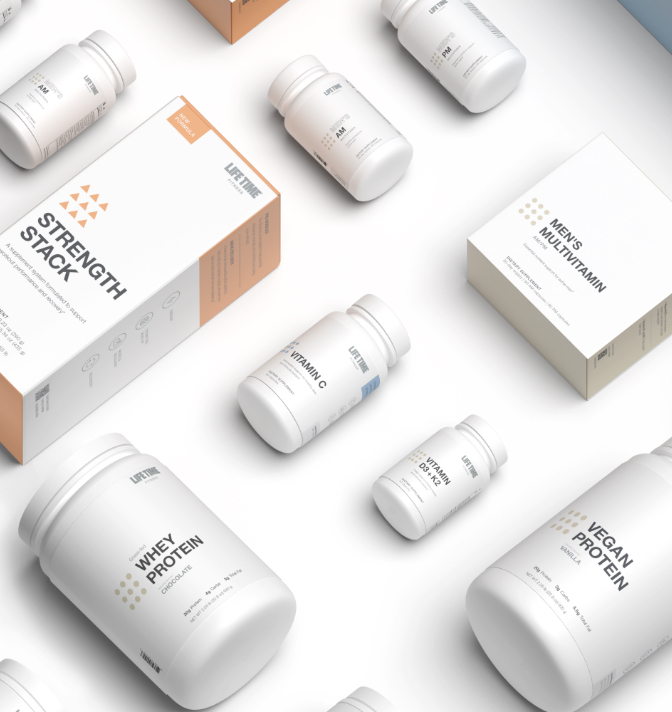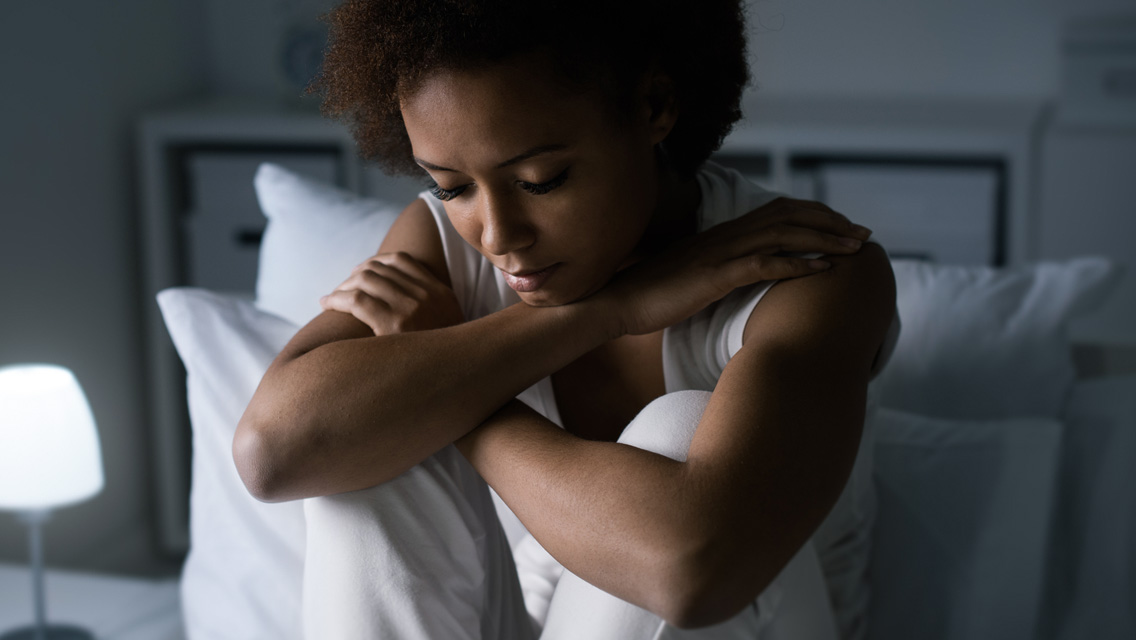You’ve likely heard about the negative, insidious health effects of chronic stress: Left unchecked, it can lead to body-wide inflammation and a variety of physical and mental issues. These include, but are not limited to, anxiety, depression, insomnia, cardiovascular disease, digestive upset, burnout, and chronic disease.
When you’re living with stress and its effects every day, you may feel stuck and left wondering whether it’s possible to actively manage it in a practical way.
The good news is that restorative lifestyle strategies, nutrient-dense foods, a balanced exercise regimen, and specialized supplementation can all support a healthier stress response.
Adaptogens fall into the category of supplements. These botanical remedies are reported to have qualities that work with your body to aid a balanced hormonal response to everyday stressors.
In addition to better-known herbs such as ginseng and ashwagandha, there are also adaptogen blends designed to support stress relief. One of them is Relora®, a blend of extracts from two different types of bark. These extracts have been used in Traditional Chinese Medicine for thousands of years to help with anxiety, asthma, depression, and digestive issues.
What is Relora®?
Relora® is a patented, proprietary blend that is a standardized combination of Magnolia (Magnolia Officinalis) and Phellodendron (Phellodendron amurense) bark extracts.
The Magnolia extract is thought to have two primary active compounds: honokiol and magnolol. The extract from Phellodendron — which sometimes can be called cork tree or yellow fir — contains a more well-known active compound known as berberine. This is commonly taken as an isolated supplement and is touted for its role in supporting healthy blood-sugar regulation and cardiovascular health.
The Relora® blend can be taken on its own, as part of a supplement with energy-supporting B-vitamins, or even as part of a comprehensive multivitamin formula.
More About Magnolia
Of the two active compounds in Magnolia Officinalis, honokiol seems to be a more potent antioxidant than magnolol. Since active compounds in plants work synergistically, utilizing the whole extract, such as in Relora®, is typically more effective.
Multiple animal studies have detailed the potential health benefits of magnolia, including improved sleep and lower accumulation of body fat from inflammation. At higher doses, positive outcomes were seen with cognition and depressive symptoms.
The reported anti-asthmatic effects of magnolia (as well as the herbal blend Saiboku-Tu) may be attributed in part to the muscle relaxation effects of honokiol and magnolol.
In humans, Magnolia supplementation and usage are correlated with improved oral health, positive mood and sleep effects in menopause, and changes in stress-eating habits. It’s thought that these outcomes are due to the reduction of cortisol (our primary stress hormone) and the support of GABA, which is an important, calming neurotransmitter.
It’s promising role in fighting certain cancers, such as breast, ovarian, prostate and multiple myeloma, is also being explored.
Honokiol and magnolol are fat-soluble, meaning they’re better absorbed and utilized when taken with a meal. This effect may be enhanced when taken with ginger or when it’s consumed as a tea. It’s important to note that it’s hard to standardize Magnolia as a tea, so it’s tough to know the dose of the compounds being ingested.
A Bit About Phellodendron
The bark of the Phellodendron (also known as Amur cork or yellow fir) tree contains berberine, which is both fat- and water-soluble. Studies have shown that berberine, in combination with Citrus sinesis peel, may support joint health and cartilage; weight loss; and healthy levels of cholesterol, blood pressure, and fasting blood sugar.
In rats, Phellodendron has been sown to support cognitive function and more balanced inflammation.
The National Cancer Institute lists Phellodendron amurense extract in its drug directory, noting its “anti-inflammatory, antioxidant, and potential chemopreventative and antineoplastic activities.” It has some potential to both limit growth of and support programmed cell death of tumors.
A Dynamic Duo
When combined, the Magnolia and Phellodendron extracts, as in Relora®, have some interesting effects.
Multiple animal studies show the blend’s potential in reducing depressive symptoms, modulating inflammation from exercise, and supporting anxiety — without the common sedative side effects that happen with certain medications.
Human studies have demonstrated that the combination of the two plays a role in reducing the effect of transient stress and supporting mood and feelings of vigor (i.e., the opposite of burnout). These benefits are likely due to a reduction in salivary cortisol.
It’s common to feel mentally exhausted when under chronic stress. One promising study on 161 cadets showed that the blend of these two extracts resulted in a “pronounced antifatigue effect” with one-time supplementation at two different doses.
In another study of students taking exams, 20 days of consistent supplementation showed improvements in physical fitness, mental fatigue, and feelings of well-being.
There might also be some relief for those who tend to turn to food for comfort in times of stress. In a small study on those who struggle with stress eating, the supplemented group that was taking the combination of Magnolia and Phellodendron extracts found in Relora® had lower levels of evening cortisol (a stress hormone that should be lower at night) and did not gain weight compared to the control group.
How to Safely Use Relora®
Those who are experiencing chronic stress — and most of us are, to some degree — often do not feel great. Sufferers, including many of my clients, report everything from edginess and irritability to sleeplessness and diarrhea.
Strategic, appropriate supplementation can serve as an easy win to get started on a better path, especially when stress levels are so high that the concept of stress management feels, ironically, like another overwhelming to-do.
For those who have higher-than-optimal cortisol levels, I’ve seen positive effects from the intermittent use of Relora®. Though it’s anecdotal, I often hear clients say that Relora® helps them feel calmer, more balanced, and more like themselves.
In working with their doctors, improved cortisol trends seem to align with these self-observations. Most often, clients opt to use a targeted Relora® blend for a few months (during times of heightened stress) and then transition to a multivitamin with Relora® at a lower dose to help maintain.
Always consult with your physician and pharmacist before introducing supplements. Botanicals and herbals can interact with medications (such as those for blood clotting or management of anxiety and depression), and they may not be appropriate for those with certain conditions, such as pregnancy.
Supplements like Relora® are never a replacement for purposeful stress management though balanced exercise, mindset shifts, coping strategies, and nutrient-dense food choices. When used strategically, however, they can be part of an efficient plan to get you feeling like the best version of yourself again.
References
Campus, G., et al. “Effect of a Sugar-Free Chewing Gum Containing Magnolia Bark Extract on Different Variables Related to Caries and Gingivitis: A Randomized Controlled Intervention Trial.” Caries Research, vol. 45, no. 4, 2011, pp. 393–99, doi:10.1159/000330234.
—. “Effect of a Sugar-Free Chewing Gum Containing Magnolia Bark Extract on Different Variables Related to Caries and Gingivitis: A Randomized Controlled Intervention Trial.” Caries Research, vol. 45, no. 4, 2011, pp. 393–99, doi:10.1159/000330234.
Chen, Chang-Rui, et al. “Magnolol, a Major Bioactive Constituent of the Bark of Magnolia Officinalis, Induces Sleep via the Benzodiazepine Site of GABA(A) Receptor in Mice.” Neuropharmacology, vol. 63, no. 6, Nov. 2012, pp. 1191–99, doi:10.1016/j.neuropharm.2012.06.031.
Garrison, Robert, and Walter G. Chambliss. “Effect of a Proprietary Magnolia and Phellodendron Extract on Weight Management: A Pilot, Double-Blind, Placebo-Controlled Clinical Trial.” Alternative Therapies in Health and Medicine, vol. 12, no. 1, Feb. 2006, pp. 50–54.
—. “Effect of a Proprietary Magnolia and Phellodendron Extract on Weight Management: A Pilot, Double-Blind, Placebo-Controlled Clinical Trial.” Alternative Therapies in Health and Medicine, vol. 12, no. 1, Feb. 2006, pp. 50–54.
Hibasami, H., et al. “Honokiol Induces Apoptosis in Human Lymphoid Leukemia Molt 4B Cells.” International Journal of Molecular Medicine, vol. 2, no. 6, Dec. 1998, pp. 671–73, doi:10.3892/ijmm.2.6.671.
Ishitsuka, Kenji, et al. “Honokiol Overcomes Conventional Drug Resistance in Human Multiple Myeloma by Induction of Caspase-Dependent and -Independent Apoptosis.” Blood, vol. 106, no. 5, Sept. 2005, pp. 1794–800, doi:10.1182/blood-2005-01-0346.
James, Michael A., et al. “Dietary Administration of Berberine or Phellodendron Amurense Extract Inhibits Cell Cycle Progression and Lung Tumorigenesis.” Molecular Carcinogenesis, vol. 50, no. 1, Jan. 2011, pp. 1–7, doi:10.1002/mc.20690.
Kalman, Douglas S, et al. “Effect of a Proprietary Magnolia and Phellodendron Extract on Stress Levels in Healthy Women: A Pilot, Double-Blind, Placebo-Controlled Clinical Trial.” Nutrition Journal, vol. 7, Apr. 2008, p. 11, doi:10.1186/1475-2891-7-11.
Kim, Joo-Hee, et al. “Effect of Phellodendron Amurense in Protecting Human Osteoarthritic Cartilage and Chondrocytes.” Journal of Ethnopharmacology, vol. 134, no. 2, Mar. 2011, pp. 234–42, doi:10.1016/j.jep.2010.12.005.
Kim, Young-Je, et al. “Long-Term Supplementation of Honokiol and Magnolol Ameliorates Body Fat Accumulation, Insulin Resistance, and Adipose Inflammation in High-Fat Fed Mice.” Molecular Nutrition & Food Research, vol. 57, no. 11, Nov. 2013, pp. 1988–98, doi:10.1002/mnfr.201300113.
Ko, Chien-Hsin, et al. “Inhibition of Smooth Muscle Contraction by Magnolol and Honokiol in Porcine Trachea.” Planta Medica, vol. 69, no. 6, June 2003, pp. 532–36, doi:10.1055/s-2003-40654.
Kuribara, H., et al. “Behavioural Pharmacological Characteristics of Honokiol, an Anxiolytic Agent Present in Extracts of Magnolia Bark, Evaluated by an Elevated plus-Maze Test in Mice.” The Journal of Pharmacy and Pharmacology, vol. 50, no. 7, July 1998, pp. 819–26, doi:10.1111/j.2042-7158.1998.tb07146.x.
Lee, Bombi, et al. “Phellodendron Amurense and Its Major Alkaloid Compound, Berberine Ameliorates Scopolamine-Induced Neuronal Impairment and Memory Dysfunction in Rats.” The Korean Journal of Physiology & Pharmacology: Official Journal of the Korean Physiological Society and the Korean Society of Pharmacology, vol. 16, no. 2, Apr. 2012, pp. 79–89, doi:10.4196/kjpp.2012.16.2.79.
Li, Lu-Fan, et al. “Antidepressant-like Effect of Magnolol on BDNF up-Regulation and Serotonergic System Activity in Unpredictable Chronic Mild Stress Treated Rats.” Phytotherapy Research: PTR, vol. 26, no. 8, Aug. 2012, pp. 1189–94, doi:10.1002/ptr.3706.
Liu, Y., et al. “Enhancement of Therapeutic Effectiveness by Combining Liposomal Honokiol with Cisplatin in Ovarian Carcinoma.” International Journal of Gynecological Cancer: Official Journal of the International Gynecological Cancer Society, vol. 18, no. 4, Aug. 2008, pp. 652–59, doi:10.1111/j.1525-1438.2007.01070.x.
Mucci, M., et al. “Soy Isoflavones, Lactobacilli, Magnolia Bark Extract, Vitamin D3 and Calcium. Controlled Clinical Study in Menopause.” Minerva Ginecologica, vol. 58, no. 4, Aug. 2006, pp. 323–34.
“NCI Drug Dictionary.” National Cancer Institute, 2 Feb. 2011, https://www.cancer.gov/publications/dictionaries/cancer-drug.
Oben, Julius, et al. “Phellodendron and Citrus Extracts Benefit Cardiovascular Health in Osteoarthritis Patients: A Double-Blind, Placebo-Controlled Pilot Study.” Nutrition Journal, vol. 7, May 2008, p. 16, doi:10.1186/1475-2891-7-16.
Peng, Wen-Huang, Chi-Rei Wu, et al. “Anxiolytic Effect of Berberine on Exploratory Activity of the Mouse in Two Experimental Anxiety Models: Interaction with Drugs Acting at 5-HT Receptors.” Life Sciences, vol. 75, no. 20, Oct. 2004, pp. 2451–62, doi:10.1016/j.lfs.2004.04.032.
Peng, Wen-Huang, Kuan-Lin Lo, et al. “Berberine Produces Antidepressant-like Effects in the Forced Swim Test and in the Tail Suspension Test in Mice.” Life Sciences, vol. 81, no. 11, Aug. 2007, pp. 933–38, doi:10.1016/j.lfs.2007.08.003.
Poivre, Mélanie, and Pierre Duez. “Biological Activity and Toxicity of the Chinese Herb Magnolia Officinalis Rehder & E. Wilson (Houpo) and Its Constituents.” Journal of Zhejiang University.
Shevtsov, V. A., et al. “A Randomized Trial of Two Different Doses of a SHR-5 Rhodiola Rosea Extract versus Placebo and Control of Capacity for Mental Work.” Phytomedicine, vol. 10, no. 2, Jan. 2003, pp. 95–105, doi:10.1078/094471103321659780.
Shigemura, Katsumi, et al. “Honokiol, a Natural Plant Product, Inhibits the Bone Metastatic Growth of Human Prostate Cancer Cells.” Cancer, vol. 109, no. 7, Apr. 2007, pp. 1279–89, doi:10.1002/cncr.22551.
Spasov, A. A., et al. “A Double-Blind, Placebo-Controlled Pilot Study of the Stimulating and Adaptogenic Effect of Rhodiola Rosea SHR-5 Extract on the Fatigue of Students Caused by Stress during an Examination Period with a Repeated Low-Dose Regimen.” Phytomedicine, vol. 7, no. 2, Apr. 2000, pp. 85–89, doi:10.1016/S0944-7113(00)80078-1.
Talbott, Shawn M., et al. “Effect of Magnolia Officinalis and Phellodendron Amurense (Relora®) on Cortisol and Psychological Mood State in Moderately Stressed Subjects.” Journal of the International Society of Sports Nutrition, vol. 10, Aug. 2013, p. 37, doi:10.1186/1550-2783-10-37.
Wolf, Ido, et al. “Honokiol, a Natural Biphenyl, Inhibits in Vitro and in Vivo Growth of Breast Cancer through Induction of Apoptosis and Cell Cycle Arrest.” International Journal of Oncology, vol. 30, no. 6, June 2007, pp. 1529–37.
Xu, H. L., et al. “Targeting Apoptosis Pathways in Cancer with Magnolol and Honokiol, Bioactive Constituents of the Bark of Magnolia Officinalis.” Drug Discoveries & Therapeutics, vol. 5, no. 5, Oct. 2011, pp. 202–10, doi:10.5582/ddt.2011.v5.5.202.
Xu, Qun, et al. “Antidepressant-like Effects of the Mixture of Honokiol and Magnolol from the Barks of Magnolia Officinalis in Stressed Rodents.” Progress in Neuro-Psychopharmacology & Biological Psychiatry, vol. 32, no. 3, Apr. 2008, pp. 715–25, doi:10.1016/j.pnpbp.2007.11.020.
Yi, Li-Tao, et al. “Antidepressant-like Synergism of Extracts from Magnolia Bark and Ginger Rhizome Alone and in Combination in Mice.” Progress in Neuro-Psychopharmacology & Biological Psychiatry, vol. 33, no. 4, June 2009, pp. 616–24, doi:10.1016/j.pnpbp.2009.03.001.
Zhao, Chao, and Zai-Qun Liu. “Comparison of Antioxidant Abilities of Magnolol and Honokiol to Scavenge Radicals and to Protect DNA.” Biochimie, vol. 93, no. 10, Oct. 2011, pp. 1755–60, doi:10.1016/j.biochi.2011.06.012.




